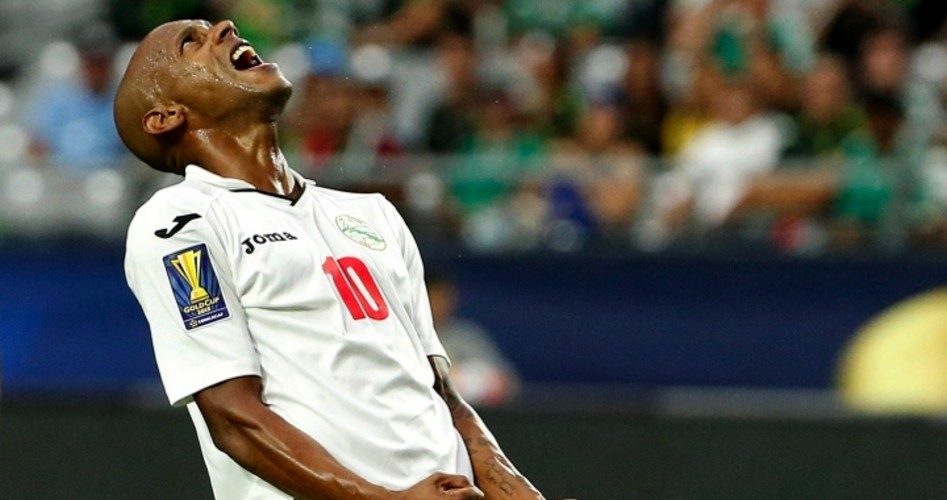
At the end of the soccer game between Cuba and Guatemala at the Pan Am Games in Toronto last week, star midfielder Ariel Martínez (shown) began weeping in the middle of the field. Many felt that he should have been celebrating, since Cuba bested Guatemala in the contest 1-0.
But Martínez was crying because he had made his decision to defect to the United States, and would be leaving everything he had known behind: family, friends, teammates, and ties to his country. But the opportunity to pursue his dream overcame them all:
At the end of the game, I felt really nostalgic leaving my teammates behind. They’re like brothers to me. And I cried like a child because I’m leaving a lot behind in Cuba: my mom, my grandmother, my brothers. But I have a dream, and I want to make it come true. I don’t know how it’s going to go, but my new career playing soccer in the US starts today.
Martínez was not the only one facing fear of retribution from his decision. Three other members of his team made the same decision, leaving the team short-handed and lucky to have beaten Guatemala.
Two members of Cuba’s baseball team defected during warm-ups for the games two weeks earlier and were joined a couple of weeks later by four rowers from the Cuban team. Half of Cuba’s field hockey team also defected, leaving them desperately short in contests with Trinidad and Tobago, resulting in back-to-back shutouts, 13-0 and 13-0.
Two years ago, soccer standout Maikel Chang joined two of his teammates, Odisnel Cooper and Heviel Cordoves, in defecting during the World Cup matches, also held in Toronto. They grabbed their passports and a bag of their belongings, clambered down a fire escape in the middle of the night to avoid detection by their coaches, and bolted down the street, crossing the border at Niagara Falls.
They also saw their opportunity, and seized it. Said Chang, speaking in Spanish, “We had to do it if we wanted to play professional soccer. We also had to do it while we’re still young. We had already played at all levels in the [Cuban] national team and we realized that there was nowhere else to go.”
Cubans have a long history of wanting to leave Castro’s socialist paradise, some to avoid the persecution and heavy demands placed upon its peoples. Most just want a chance to live, to breathe, and to take a chance at a better life. In 1999, eight members of the Cuban delegation attending the Pan Am Games in Winnipeg defected, while two players with the Cuban women’s soccer team defected in 2011.
Despite the alleged warming of relations between the United States and Cuba, thanks to efforts by the Obama administration, these freedom seekers didn’t want to wait around. Said Jamie Liew, an Ottawa lawyer specializing in immigration and refugee law, “There is still a lot of uncertainty.… There is a healthy skepticism that anything in the near future will change in Cuba.”
Making the decision to defect is difficult, according to Chang: “I can tell you that all my fellow Cuban players would like to be here [in the United States] to play professional soccer, but this is a very difficult decision to make. This is a decision you cannot undo.”
Not everyone is interested in seizing the opportunity to work for a better life. Mijain Lopez, a two-time defending champion Olympic gold medalist in Greco-Roman wrestling, likes living in Castro’s Cuba:
I never thought of leaving Cuba. I love my people, my country. Those guys that defected have betrayed our revolution. I hope they’re happy. They have left something beautiful behind, which is socialism and our country’s dignity. Let them do what they can in other countries. We will continue doing what we can for the revolution [here].
Cuban-born Enrique Montana emigrated to Canada five years ago and now sports a Canadian passport. He is happy, contradicting Lopez:
I think people should be able to choose the path they want. If people want to stay [in Cuba], they stay. If they want to leave, they [should be able to] leave. Maybe it upsets somebody else. It’s not my problem. Everybody has a right to choose whatever they want.
Dozens of Cuban baseball players have defected, including José Abreu of the Chicago White Sox, Yasiel Puig of the Los Angeles Dodgers and Aroldis Chapman of the Cincinnati Reds.
Decisions to defect during the Pan Am Games are aided by the Clinton-era “wet-foot, dry-foot” policy: A Cuban defecting on land has a better chance of obtaining legal permanent resident status (leading eventually to U.S. citizenship) than does his counterpart trying to immigrate by sea. Cubans caught in the waters between the two nations are summarily returned to Cuba, to face the punishment doled out to those seeking to escape the glories of Castro’s paradise. In July, 2003, a dozen Cubans stole a boat from a marina. It was intercepted by the U.S. Coast Guard, which forcibly returned them to Cuba where each of them faced 10 years in jail for trying to escape.
Photo of Ariel Martínez: AP Images
A graduate of an Ivy League school and a former investment advisor, Bob is a regular contributor to The New American magazine and blogs frequently at www.LightFromTheRight.com, primarily on economics and politics.



